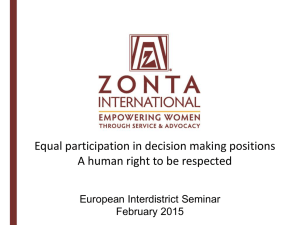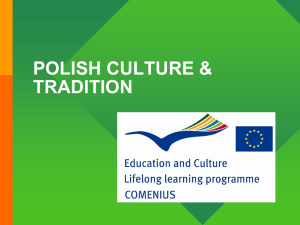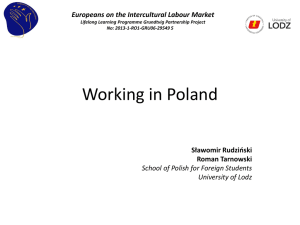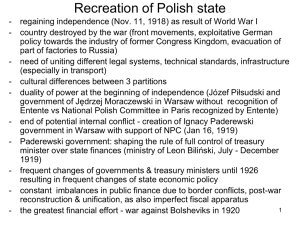EDUCATION OF WOMEN - United Cities and Local Governments
advertisement
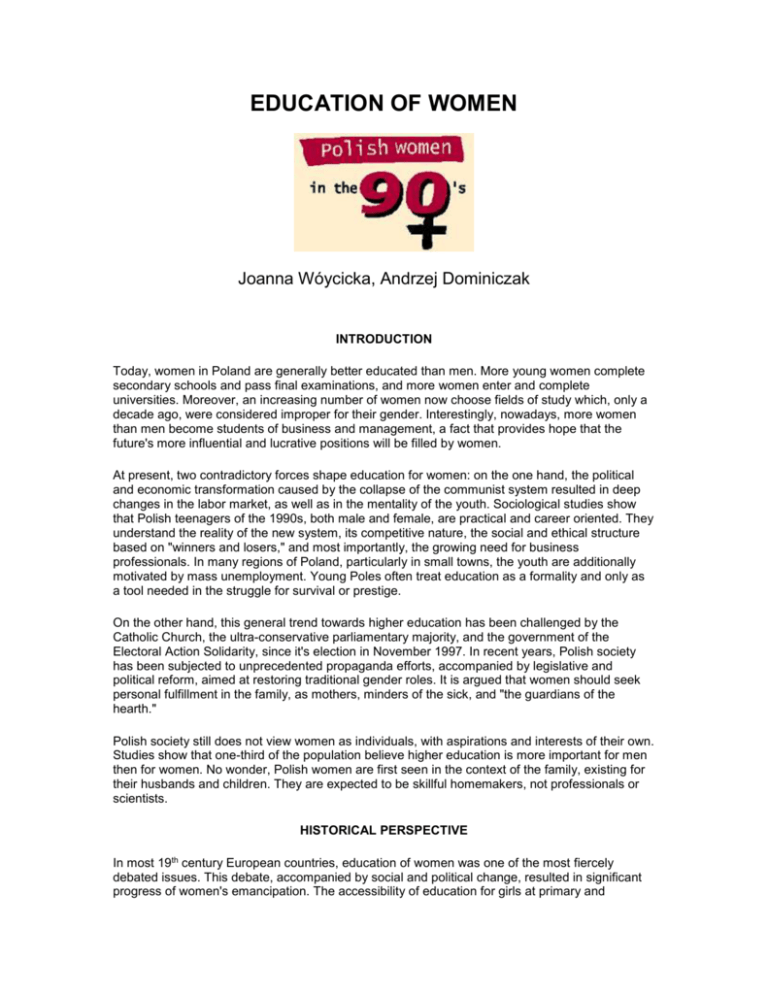
EDUCATION OF WOMEN Joanna Wóycicka, Andrzej Dominiczak INTRODUCTION Today, women in Poland are generally better educated than men. More young women complete secondary schools and pass final examinations, and more women enter and complete universities. Moreover, an increasing number of women now choose fields of study which, only a decade ago, were considered improper for their gender. Interestingly, nowadays, more women than men become students of business and management, a fact that provides hope that the future's more influential and lucrative positions will be filled by women. At present, two contradictory forces shape education for women: on the one hand, the political and economic transformation caused by the collapse of the communist system resulted in deep changes in the labor market, as well as in the mentality of the youth. Sociological studies show that Polish teenagers of the 1990s, both male and female, are practical and career oriented. They understand the reality of the new system, its competitive nature, the social and ethical structure based on "winners and losers," and most importantly, the growing need for business professionals. In many regions of Poland, particularly in small towns, the youth are additionally motivated by mass unemployment. Young Poles often treat education as a formality and only as a tool needed in the struggle for survival or prestige. On the other hand, this general trend towards higher education has been challenged by the Catholic Church, the ultra-conservative parliamentary majority, and the government of the Electoral Action Solidarity, since it's election in November 1997. In recent years, Polish society has been subjected to unprecedented propaganda efforts, accompanied by legislative and political reform, aimed at restoring traditional gender roles. It is argued that women should seek personal fulfillment in the family, as mothers, minders of the sick, and "the guardians of the hearth." Polish society still does not view women as individuals, with aspirations and interests of their own. Studies show that one-third of the population believe higher education is more important for men then for women. No wonder, Polish women are first seen in the context of the family, existing for their husbands and children. They are expected to be skillful homemakers, not professionals or scientists. HISTORICAL PERSPECTIVE In most 19th century European countries, education of women was one of the most fiercely debated issues. This debate, accompanied by social and political change, resulted in significant progress of women's emancipation. The accessibility of education for girls at primary and secondary levels increased greatly; in the second half of the century, women were allowed to enter universities, first in Switzerland, France, England and Belgium. At this time, Poland was ruled by the three partitioning powers: Russia, Prussia and Austria. All three were among the most conservative European countries, a fact that hindered the progress of education for women. Prussia was the most conservative; in fact, in this partition many secondary girls' schools were closed down, and the importance of women's university education was minimally recognized, partly due to prevailing traditional attitudes and partly due to governmental policy: the opposition to university education for women was stronger in Germany than in any other European country (Mazurczak, 1995). German universities were only made fully accessible for women in 1908. The other regions of Poland faced relatively better situation. In the late 1840s, in the Russian partition, men and women from the "Enthusiasts" movement, numerous writers, intellectuals and radical democrats, inspired by the ideas of the "Springtime of Nations", demanded that women should have the right to higher education and the right to full participation in public life. The same ideas were promoted in the second half of the 18th century by Polish Positivists and "Emancipated Women," the most prominent of whom was a well-known Polish writer, Eliza Orzeszkowa. Moreover, after the failure of the January Rising (1863-64), as a result of the Russian reprisals against the Polish landed gentry, tens of thousand of men were either exiled or forced to emigrate, and their property confiscated. The reprisals destroyed the gentry manor, which served as a cultural and educational center, causing the larger part of Polish nobility to move to towns where they turned, first, into the petty bourgeoisie, and later, into the new intelligentsia. Many women were forced to take financial responsibility for themselves and their families. Because women needed to seek employment, the need for higher education became vital and was rarely questioned. Many in the Austrian partition also engaged in heated debates on women's education. Curiously, a significant amount of the region's men, including positivist political writers and university professors, supported women's right to higher education (Mazurczak, 1995). Relatively wide support in academic circles brought positive practical change. In 1868, almost thirty years before women were allowed to enter universities, the first Higher Courses for Women were established in Krakow. The courses were highly respected and widely popular, even after women were accepted at the Jagiellonian University in 1894. In the Russian partition, some Polish women attended the Higher Courses for Women organized in 1878 in Petersburg. The courses were divided into two faculties, humanities and sciences, and lasted four years. However, the so-called "Flying University," an underground school established in Warsaw in 1886 had an even greater impact. The school was often called a "feminine university," since women accounted for approximately 70% of its students. In its peak academic year, 1899-90, about 1000 students studied at this underground institution which, in 1906, was finally legalized and renamed Higher Courses for Women. Thanks to the "Flying University" and numerous other educational initiatives from that period, women's aspirations for higher education were at least partly met before women were allowed to enter Warsaw University during the First World War. Nineteen eighteen, the year of Polish independence, may have granted women political and social equality, but it did not necessary establish equal levels of educational and professional opportunities. Even in 1931, 27,9% of Polish women were illiterate (Dabic, 1994). Although the situation improved slowly in the 1930's, and in 1937 women accounted for 27,7% of graduates of Higher Education, the number of illiterate remained high and many women were practically excluded from numerous fields of studies and professional activities. After the Second World War, in communist Poland, women's rights, including the right to higher education, became an important part of the official propaganda, and to a lesser degree a part of government policy. Between 1945 and 1995, the number of female university graduates doubled, while the number of men remained constant (Bia³ecki, 1997). In spite of the growing number of female students, however, the traditional pattern according to which women were either "fit" or "unfit" for certain areas of study continued, thus reinforcing the stereotyped,gender biased division of social roles. SOCIOLOGICAL PERSPECTIVE Currently, Poland has witnessed a rebirth of ultra-conservative ideology, advocated by the Catholic Church and its political allies. These groups are trying to persuade Polish society that all progressive ideas, particularly those concerning women's and sexual liberation, have been imposed by either the communists and their allies or their naive Western "de facto" supporters. Feminism has been accused of being a source of all social and moral evil and women's higher education and professional aspirations have often been criticized as "corrupt equality," incompatible to the true nature of women and the largest contributing factor of women's personal unhappiness. This ideology is currently supported by a considerable number of Polish men and women. Sociological studies conducted in 1995 - 97 revealed that 70% of Poles feel that women can only achieve fulfillment as mothers (Siemieñska, 1998). The same studies show that approximately 33% of the population also believe that a university education is more important for men than for women. This last view is particularly important today, as the cost of education is rising and parents often must choose who, a son or a daughter, should attend the university (Siemieñska, 1998). In another study, 40% of respondents categorically supported the idea that the family and household should be the principal domain of women's activities (Domañski, 1995). The same study shows that 40% of women believe that it is better for the family if the husband earns their living and the wife takes care of the family. Stereotyped opinions about women's role in society form the basis for girls' up bringing in average Polish families. The belief that girls and boys have different personalities, needs, and values, and that social roles of men and women should differ is deeply rooted in Polish culture (Firkowska, 1995). Consequently, Polish parents raise their daughters to be tender, polite, caring, submissive, and willing to make sacrifices, in order to be good wives and mothers. At the same time, boys are brought up to be able to cope with life and to form professional careers; they are encouraged to train and compete to achieve success. Women are still expected to behave in compliance with the historically shaped image of the "Polish Mother," whose only role is to raise sons, fighters for national independence. Currently, this traditional role is reinforced by the Catholic Church, whose educational ideal for girls is based on the image of Holy Virgin. The teachings of the Church influence girls from early childhood, when primary schools and kindergartens teach religion classes. Although Polish women are better educated than men, and the majority are employed in jobs outside the homes, 80% still consider housework to be their naturally ordained, and exclusive duty (Dabic, 1994). Poland is still a country where radition prevails. LEGAL AND POLITICAL PERSPECTIVE Constitutional Law It is commonly believed that Polish law does not discriminate against women. However, general constitutional guarantees of gender equality, and provisions concerning equal access to education, are far from satisfactory and not enforceable in practice. Many, including the judiciary, regard the Polish constitution as a solemn declaration of will rather than a law, although, theoretically, the new 1997 Constitution is directly applicable. The Constitution contains two articles that directly pertain to gender equality in the field of education: Article 33, Clause 2 Men and women shall have equal rights, in particular, regarding education, employment and promotion, and shall have the right to equal pay for work of equal value, to social security, to hold offices, and to receive public honors and decorations. Article 70, Clause 4 Public authorities shall ensure universal and equal access to education for citizens. To this end, they shall establish and support the systems of financial and organizational assistance for pupils and students. The conditions of such assistance shall be specified by statute. Despite these ideals, the constitutional provisions have no practical meaning. On the contrary, governmental programs and policies, as well as internal regulations of various educational institutions make them entirely fictional. For example, contrary to Clause 2 of Article 70, which provides, "education in public schools shall be gratuitous," public schools, particularly universities, impose high fees, which, in practice, discriminate against women (See: Sociological Perspective). International Law The Polish parliament has ratified several international treaties and conventions that directly or indirectly promote gender equality in education. According to the new constitution, ratified international laws are directly applicable and superior to domestic statutory laws. Moreover, Poland, as a member of the Council of Europe, is obliged to follow the Council's recommendations. The following selected provisions of these international documents are not observed by Polish authorities: 1) The UN Convention Against Discrimination in Education (ratified in 1964) Article 3 In order to eliminate and prevent discrimination within the meaning of this Convention, the States Parties thereto undertake: 1. To ensure, by legislation where necessary, that there is no discrimination in the admission of pupils to educational institutions Article 4 The States Parties to this Convention undertake furthermore to formulate, develop and apply a national policy which, by methods appropriate to the circumstances and to national usage, will tend to promote equality of opportunity and of treatment in the matter of education and in particular: 1. To make primary education free and compulsory; make secondary education in its different forms generally available and accessible to all; make higher education equally accessible to all on the basis of individual capacity; assure compliance by all with the obligation to attend school prescribed by law; Polish authorities, in the recently introduced educational reform, developed and applied a policy that reinforces traditional, stereotyped views of gender roles and encourages women to relinquish educational aspirations for the sake of the family. Contrary to the above quoted provisions, Polish authorities tolerate discrimination in the admission of students to educational institutions. A growing number of schools (e.g. Warsaw prestigious Batory gymnasium or Higher Police School) have introduced quotas for men candidates, thus violating the principle of equal access to all on the basis of individual capacity. 1. The UN Convention on the Elimination of All Forms of Discrimination against Women (ratified by Poland in 1981) Article 10 States Parties shall take all appropriate measures to eliminate discrimination against women in order to ensure to them equal rights with men in the field of education and in particular to ensure, on a basis of equality of men and women: (a) The same conditions for career and vocational guidance, for access to studies and for the achievement of diplomas in educational establishments of all categories in rural as well as in urban areas; this equality shall be ensured in pre-school, general, technical, professional and higher technical education, as well as in all types of vocational training; (c) The elimination of any stereotyped concept of the roles of men and women at all levels and in all forms of education by encouraging coeducation and other types of education which will help to achieve this aim and, in particular, by the revision of textbooks and school programs and the adaptation of teaching methods; (h) Access to specific educational information to help to ensure the health and well-being of families, including information and advice on family planning. Ministerial authors of the currently introduced education reform emphasize the role of moral education. In their opinion, moral education should be based on respect for Christian and family values, such as the Church's teaching that marriage is an unbreakable bond, even violent or abusive marriages. 1. International Covenant on Economic, Social and Cultural Rights (ratified by Poland in 1977). Article 13 The States Parties to the present Covenant recognize the right of everyone to education. They agree that education shall be directed to the full development of the human personality and the sense of its dignity, and shall strengthen the respect for human rights and fundamental freedoms. .." In 1998, the UN Committee on Economic, Social and Cultural Rights issued "comments and recommendations," based on reports by the Polish government and a women's NGO on the country's observance of the Covenant's provisions. The Committee made several critical comments concerning, among other things, the excessive role of the Catholic Church and the restrictions on reproductive rights. The comments were followed by a set of recommendations, two of which pertained to education of women. The Committee called for the government to ensure respect for all religious minorities, particularly in regard to education, gender equality and health care. It also recommended that the Program of Action for Women be enforced, that family planning methods be available to all, and that the government provide information on safe methods of contraception and reliable, scientifically sound sexual education for children in primary and secondary schools. In response, Polish authorities suspended progress towards adopting the Program of Action for Women, increased the price of contraceptives by removing all subsidies and, in December 1998, practically withdrew sexual education from schools. Similar requirements are contained in the Recommendations on Gender Equality in Education adopted by the Council of Europe's General Assembly. The document states that "gender equality in education should be guaranteed by the educational systems of all States Parties to the European Cultural Convention." Poland ratified this international document in 1989. Statutory and governmental regulations and policies Contrary to numerous international obligations, none of the existing statutory laws deal directly with gender equality in education. The only statute distinguishing gender requires all women employed in research institutes in positions below the rank of professor (i.e. lecturers, assistants etc.) to retire at sixty, five years before men in similar positions. As a result, a woman's full academic careers has been, in fact, curtailed by ten years, not five, as the retirement age for a professor is no less than seventy (Dabic,1994). The main statutory provision, however, that effectively reinforces gender stereotypes and discrimination in education is the Preamble to the Law on Educational System. The statute includes a clause stating that education respect Christian values. Although other goals and principles outlined in the preamble seem respectful of other ethical and intellectual traditions, in practice, particularly with respect to the issue of gender equality, this seemingly modest passage plays a vital role in the governmental educational policy. The document titled "Legal Basis of the Reform of Education," issued by the Ministry of Education, lists this clause as one of the laws that constitute the legal basis for the currently implemented education reform. The document emphasizes the importance of moral education, and regards it as one of the most important aspects of the reform. In 1998, in the document introducing the principles of the new reform, the government criticized the former educational system for being based on diverse and, allegedly, contradictory educational model, which led to "moral chaos and social evil." (Dominiczak, 1998). Moreover, according to the officials from the Ministry of Education, in order for moral education to be effective, it must be based on coherent moral code, obligatory for all involved in the educational process, pupils and teachers. School principles are responsible for pursuing an employment policy to ensure this moral coherence is effectively preserved. The authors of the reform also presented the Governmental Program for the Family as fundamental. It was adopted in 1998 by the Social Committee of the Council of Ministers. The program, the central idea of which is that marriage is an unbreakable bond, contains a section "On Moral Education of Young Generation." None of the seventeen goals listed in the program concerns gender equality in education or similar issues; on the contrary, it concentrates on the protection of the family as a whole, neglecting entirely the interests and needs of its members. Finally, the Law on Family Planning and the Protection of a Human Fetus did, in the original version, contain provisions introducing sexual education to primary and secondary schools. The law was amended in December 1998 and sexual education as a separate subject was withdrawn from the school curricula. This de facto liquidation of sexual education should be considered as yet another educational "success" of the Minister of Education. He proposed removing sexual education from schools in November 1997, as his first project after nomination as a minister. Neither the present Polish government nor the parliament has done anything to meet its constitutional and international obligations concerning gender equality in education; on the contrary, both governing bodies have passed laws and pursued policies that reinforce stereotypes, support traditional family models, and discriminate against women in all fields of social life, including education. The Polish Ministry of Education has not offered guidelines for teachers, nor has it organized trainings to promote gender equality in school, family, or public life. Instead, the Ministry regards the teachers who will not fully conform with its discriminatory orders and policies as "morally incoherent." WOMEN AND GIRLS IN EDUCATIONAL SYSTEM Primary Education The manner Polish boys and girls are educated at primary level is often gender specific. In a majority of schools (with the exception of private schools) the so-called "manual classes" are organized separately for boys and girls. These classes provide training in basic domestic skills, according to the traditional perception of what is "masculine" or "feminine." Thus, boys acquire technical knowledge, learning ironwork and carpentry. Girls, on the other hand, are trained in cooking, baking and knitting. The very fact that schools organize separate classes for each gender makes children believe that women and men are either "fit" or "unfit" for certain activities and that jobs are typically "masculine" or "feminine." Because children often see the same traditional division in their families, schools reinforce this stereotyped gender biased socialization. Serious doubts can be raised about the contents of primers and other textbooks used in primary schools. Although Poland is a signatory to the Convention on the Elimination of all Forms of Discrimination against Women, most Polish textbooks are incompatible to the Convention's provisions that state that the government is responsible for the elimination of gender biased social roles. In most texts, women and men are described in traditional roles: mothers usually are busy with cooking or ironing, while fathers are engaged in DIY. Moreover, pictures in these books usually show women as unattractive homemakers, wearing an apron or a bathrobe. Women's contact with children is also limited to basic parental duties: they serve meals, cook, or help kids with their homework. Fathers, on the contrary, are shown in elegant suits and are never involved in traditional housework. Their contact with children is far more varied and attractive: fathers go with their children on excursions, they explain to them difficult issues, or invent interesting games and other activities. Other members of the family are also shown in textbooks in traditional, clearly defined roles. Grandmothers and older sisters help mothers with domestic chores while boys either get ready for exciting trips with their fathers or help their grandfathers pursuing their hobbies. A report published by the Polish Committee of NGOs - Beijing 1995 emphasized that the "situations described in the manuals are artificial and perpetuate false and homogenous images of women and family." Women are always pictured similarly: they have no personal aspirations, are always busy with domestic duties, and are always tired, but smiling. Women in the manuals are never irritated, nor do they complain or rebel; they humbly meet their fate. Physical education classes also help establish a gender bias. These classes are organized separately for boys and girls, although such separation in primary schools has been abandoned in most European countries. The low number of girls participating in extracurricular sport activities also reinforces the stereotype that fitness should not be a woman's concern. In Poland, sport is often considered a male-only activity; women who are involved in physical activities are seen as "unfeminine." Computer classes are yet another field of discrimination in primary schools. The number of girls who learn computer skills is considerably lower than that of boys. In extreme cases, housework classes are organized for girls when boys learn computer science. Moreover, no special software for girls to learn computer skills exists, although this specially-designed software proved very effective in German schools, where computer classes are being organized at every level of the educational process. The composition of school faculty also contributes to discriminatory culture and practices. Although women account for approximately eighty percent of teachers in primary schools, men usually hold high positions, such as school principals. As a consequence, schoolboys and girls receive the message that women are not able to make important decisions or that men should supervise women's work. Furthermore, teachers' pay in Poland is extremely low, despite the fact teachers are required to have higher education, a fact which may lead children to believe women should engage in underpaid jobs, unwanted by men. Vocational and Secondary Education In Poland, women constitute a large majority of students in secondary schools. In the 1997/98 school year, these schools had 499,625 female students and 258,076 male students. Recently, a new and interesting trend has been observed: an increasing number of young women has been choosing schools with a science curricula, traditionally a male students domain. More young men than women attend technical schools. In the 1997/98 school year, these schools had 900,553 male students and 659,384 female students. The traditional tendency to distinguish male and female jobs is most clearly evident in the gender specific curricula of the secondary vocational schools. In this school year, 355,162 male students and only 113,224 female students attended secondary technical schools, while 7,954 female students and only 200 male students attended secondary medical schools. More men than women decide to finish their education after completion of basic vocational schools. Last year (1998/99) these schools had 424,269 men and 236,877 women students. A large majority of women attend higher vocational and business colleges. In the last school year (1998/99), 51,596 females graduated among the total number of 70,491 students. Some of these colleges, e.g. secretarial, nurses and teachers colleges, are almost entirely dominated by women. Higher Education Women account for 56% of the university graduates in Poland and the percentage of women who decide to attend university is constantly growing. Over the last ten years, the percentage of female students who study the sciences has exceeded 45%. An increasing number of women also decide to study commerce and management. At present, 160,181 female and 100,677 male students attend higher business schools. The fact that more women decide to study business indicates that they are ready to pursue professional careers in an extremely competitive environment. Women choose business careers, although these positions are often incompatible with traditional style of private and family lives. In the future, these women will expect their husbands or partners to take their share of the household and parental duties. It seems that it is this group of young and dynamic women who will soon start to change the image of women as persons qualified only to look after children and to do housework. Women's Studies Although gender studies in the US and other European countries has constituted a major area of academic research for twenty years or more, Poland's first Women's Research Center was only established in 1992, at £ódŸ University. The Center employs twelve research and teaching staff representing various disciplines: anthropology, philosophy, biology, sociology, literary and theater studies, and pedagogy. The £ódŸ Center represents the Women's International Studies in Europe, an international network of academics dealing with women's issues. The Center has organized several seminars on various topics, including the policy of equal opportunities in the media, women's cinema, and women's pedagogy. The second and currently the most influential initiative started in 1996 at Warsaw University. Warsaw Gender Studies is a postgraduate college, offering an interdisciplinary approach to gender issues in a social and cultural context. The main objectives of the research and analysis conducted in the college is to determine a suitable definition of gender, the way it functions in culture, social life, and social sciences and, finally, the social consequences of the norms and stereotypes related to gender. The two years studies prepare professionals for family courts, law offices, therapy centers, media, and women's non-governmental organizations. Poznañntilde; University is Poland's most recent institution of higher education to implement a rudimentary women's program. A seminar organized on Culture and Gender is now in its second year. The participants in the seminar discuss issues from the theory of culture, to philosophy and feminist theory. The future of these and other women's studies programs, planned by women in other academic centers, is unclear. On the one hand, thanks to Western inspiration and practical assistance, an interest and need is growing in women's studies; on the other hand, however, the growing influence of the newly established theology departments may dissuade university authorities from organizing such “politically incorrect," progressive studies which are correctly considered to strengthen opposition against church teachings on the role of women in the family and society at large. Employment of Women in the Field of Education Domestic statistics on employment in education are not gender specific, although they do suggest that women constitute 77% of employees in this sector (Kalinowska, 1995). However, women in education, as in any other sector, undoubtedly occupy on an average, the lowest positions, or the positions bringing little prestige. Most women work in primary schools as teachers while men are the majority of school principals. A teachers' income, generally, is very low (approximately 200 US$ per month),a salary typical for female-dominated workplaces. More information is available on the demographics in higher education. Although, as said above, women account for 56% of graduates, statistical data shows that the number of women who are successful in academic careers is much lower than the number of men. As Table 5 shows, for example, in 1997, women constituted approximately 44.5% of instructors (the lowest university position), 34% of assistant professors, 16% of associate professors, and about an equal percentage of full professors. The situation differs significantly in each discipline. In 1990, women accounted for 73% of academic employees with a doctoral degree in pharmacy, 48% in biology, 45% in medicine and over a third in law and humanities. The percentage in other fields, however, is considerably lower. The low percentage of women with academic careers persists, despite the fact that many men give up university jobs due to the low income of the young academic staff. Today's young and educated men are strongly expected to receive a high income or, otherwise, they are considered inadequate. Women, on the other hand, often choose to resign from or postpone careers to meet family obligations. Final remarks Our analysis leads to the conclusion that the situation of women in the field of education is, in fact, much less advantageous than it might seem on the basis of general statistics. Educational programs, the way teaching is organized as well as the conservative attitudes of the major part of Polish teachers strengthen stereotyped views of women and their role in society. Discrimination in the field of education is still widespread: women's access to some branches of knowledge (such as technical sciences or computer skills) is limited, those subjects (e.g. sexual education) that are of particular importance for women are being withdrawn from schools' curricula and some teaching programs are censored and adjusted to the ruling coalition's ideology. For example, in the basic guidelines for the school programs contained in the Executive Order issued by the Minister of National Education (Official Journal of 23 February 1999) it is recommended that the so called natural family planning methods be taught, whereas medical birth control methods should be described in a way emphasizing their danger to heath and morality. Some schools openly discriminate against women candidates introducing gender quotas which, in practice, lead to the unfair and illegal rejection of a number of girls and women candidates who receive better entry examination results. Women who are employed or seek employment in the system of education fall victim to even more extreme forms of gender discrimination. In most schools they are not promoted and their work is undervalued. Women employed in scientific institutes are also forced to retire five to ten years earlier than their male colleagues, which strongly impairs their chances of attaining professional fulfillment and results in much lower retirement benefits. The most serious problem, however, is the ultra-conservative, educational policy of the present government aimed to restore the traditional, stereotyped gender roles and discriminatory social practices. According to the ruling coalition women have a natural vocation to be mothers and wives and should, first of all, be concerned about their marriage and its unbreakability. Recently, one of the ideological leaders of the ruling coalition, the Marshall of the Senate, Ms. Alicja Grzeœkowiak, in a letter to the conference, entitled “Woman in the Contemporary World" clearly expressed the coalition's view of women and their role in society: "[s]o God created man in his own image, in the image of God created he him; male and female created he them . . .[d]ifferent creation of man and different creation of woman determines different vocation of each of them." Those words were not written by a religious preacher. In Poland of the nineties they constitute the language of mainstream politicians and their political programs; education is one of their favorite playgrounds. National Plan of Action for Women - Education of Women Selected Recommendations Objectives: Objective 1. Eliminate discrimination in women's access to certain types of schools. Develop mechanisms to ensure equal access to education. Actions to be taken: prepare a catalogue of secondary and tertiary schools, educational profiles and faculties that: do not accept girls and women; apply unequal quota for girls/women and boys/men; do not create formal barriers to equal access for women and men, but for various reasons are either not attended by girls and women at all or are attended by a very small number of girls and women; analyze the barriers to girls' and women's access to education such as illegal selection practices, health barriers, difficult working conditions, social customs and stereotypes; Objective 2. Develop mechanisms ensuring equal access to education for women and men (in all types of schools and at all levels) and taking particular account of the situation in rural areas. Actions to be taken: provide specialized school and vocational counseling, free of stereotypes reinforcing the segmentation of the labor market and feminization of some of its sectors; introduce the broad profiles of vocational education for girls and boys (at all levels) to facilitate adaptation to the changing conditions and needs of a local labor market; ensure that women who dropped out of school because of family responsibilities are provided with opportunity to complete their education; ensure full and equal participation of girls and women in extracurricular activities and school facilities, such as computer or vocational classes, or business management training; ensure equal access, for girls and boys, to physical activities, recreational and sport classes, run both at and outside of school; Objective 3. Develop and adopt curricula, textbooks and teaching materials taking into account the principle of equal status of women and men. Actions to be taken: Take into account the principle of gender equality in the reform of school curricula and educational programs; obligate experts from the Ministry of National Education who evaluate textbooks and other educational materials accepted for school use to take into account the guidelines pertaining to the principle of gender equality; gradually withdraw, from school use, the textbooks reinforcing stereotyped social roles of women and men, boys and girls and disregarding the principles of equality and partnership; Objective 4. Promote the principle of equality between women and men in school curricula, educational programs and teaching materials. Actions to be taken: introduce the issue of gender equality in teachers' training programs; include information and knowledge about the family, gender equality, duties of women and men in the family and shared responsibility of all family members for its proper functioning in sexual education programs. Objective 5. Carry out and popularize through the media educational and informational programs promoting equal status of women and men. Use findings of research and studies on the situation of women and gender inequalities (including the unbalanced distribution of remunerated and unremunerated work between women and men and taking into account the situation of women in rural areas) to raise social awareness on the issue of equal rights and opportunities. Actions to be taken: Use the media to promote international documents pertaining to women's rights and gender equality; disseminate data and findings of studies providing information on the situation of women and men in Poland - support research institutions conducting such studies. Objective 6. Educate children and youths on women's rights as human rights. Actions to be taken: initiate research on the equal status of women and men and on the contribution of women to economic, social and cultural development of their regions and communities (in history and at present); develop and adopt school curricula and educational programs related to the issue of violence, including training in peaceful conflict resolution, compromise negotiating skills; raise awareness of the rights of victims of violence and knowledge about available help; include the issue of sexual harassment in school curricula and educational programs; develop education and training programs and implement them in compulsory education and training systems to enable the representatives of various professions (particularly teachers, judges, probation and police officers, prosecutors, social workers and journalists) to acquire knowledge on: gender equality and why it is necessary to respect it in practice; gender related stereotypes and the way they influence the views of social and political life; various forms of discrimination and most common discriminatory practices and why it is necessary to eliminate such practices and stereotypes. APPENDICES 1. The number of graduates in technical secondary and vocational education according to the education profile of a given school. Educational profiles Basic vocational schools - total basic vocational schools - women Technical secondary and vocational schools - total Technical secondary and vocational schools - women 1996/97 - total 211,215 77604 173,679 86,732 Pedagogical - - 7 6 Artistic - - 3204 2134 Business&Adm. 111 90 46,730 39,977 Medical 23 13 2818 2749 Technical 150,204 30,535 92,711 22,563 Agricultural (incl. Forestry and fisheries) 14,276 7448 15078 10046 349 39385 2012 739 Transport & Communication 46252 39385 11119 8518 Services 1. Vocational (post-secondary) colleges according to the type of school Years Graduates - total Female graduates Total 1996/97 70,491 51,596 Daily colleges 37219 27,941 Night colleges 7110 4885 Correspondence colleges 24,411 17,497 Type of school 1. The number of graduates in post-secondary vocational college education according to educational profile of a given college. Educational profiles 1996/97 - total Pedagogical Artistic Business&Adm. Medical Technical Agricultural (incl. Forestry and fisheries) Transport & Communication Graduates - total Female graduates 70,491 51,596 4445 3797 180 139 38,430 29,424 9972 7990 9513 4208 265 113 191 145 Services 7324 5667 Other 171 113 1. Teaching staff in the institutions of higher education Years Total Professors Associate Professors Assistant Senior Instructors Others Professors and Instructors Total: 1995/96 66,973 11,503 652 23,537 18,073 13,208 70,372 12,574 611 24,142 18,752 14,293 73,041 13,621 673 24,987 18,702 15,067 1995/96 25,227 1972 105 8044 8049 7057 1996/97 26,542 2172 100 8247 8344 7679 1997/98 27,835 2466 120 8620 8481 8148 1996/97 1997/98 Women: References: 1. Dorota Mazurczak, D¹¿enie kobiet polskich do wy¿szego wykszta³cenia na prze³omie XIX - XX wieku, w "Humanistyka i p³eæ; - studia kobiece z psychologii, filozofii i historii, Poznañ; 1995. 2. Milena Dabic, "Women and Academic Careers in Poland" w "Equality and Partnership towards Higher Education, Employment/Entrepreneurship and Environmental Management in Central and Eastern European Countries. Future Strategic Goals and Objectives. Conference Publication, Wolfheze, Holandia, 1-3 wrzeœnia 1994. 3. Renata Siemieñska, Research Report presented at the Conference "Barriers to Reconciling Private and Public lives", November, 1998 4. Andrzej Dominiczak, O reformie edukacji, Bez Dogmatu (Without Dogma Quarterly), No 37, Summer 1998. 5. El¿bieta Kalinowska, Women in Public Sphere, The Situation of Women in Poland.NGO's Report, Warsaw, March 1995. 6. Statistical Yearbook of the Republic of Poland, Central Statistical Office, 1998. 7. Sytuacja Kobiet w Polsce. Raport organizacji pozarz¹dowych, Warszawa, marzec 1995. 8. Henryk Domañski, "Równouprawnienie. Stereotyp tradycyjnego podzia³u ról" w: " Co to znaczy byæ; kobiet¹; w Polsce", praca zbiorowa pod redakcj¹; Anny Titkow i Henryka Domañskiego. Polska Akademia Nauk. Instytut Filozofii i Socjologii. Warszawa 1995. 9. Anna Firkowska - Mankiewicz' "Czy tak samo wychowujemy dzieci?" - Tam¿e. Ireneusz Bia³ecki, "Nierównoœci w dostêpie do kszta³cenia w Polsce powojennej" w "Wokó³ zawodowego równouprawnienia kobiet i mê¿czyzn", Wydawnictwo Naukowe SCHOLAR, Warszawa 1997 r.

